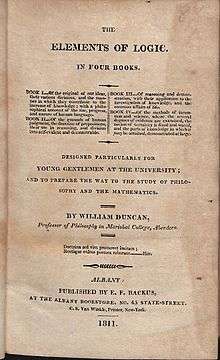Gnosology
In philosophy, gnosology (also known as gnoseology or gnostology[2]) literally means the study of gnosis[3], meaning knowledge or esoteric knowledge. The study of gnosis itself covers a number of subjects, which include magic, noetics, gnostic logic, and logical gnosticism, among others.[4] Gnosology has also been used, particularly by James Hutchison Stirling[2], to render Johann Gottlieb Fichte's term for his own version of transcendental idealism, Wissenschaftslehre, meaning "Doctrine of Knowledge".[5]

In Immanuel Kant's gnosology, intuition takes a prominent position and was introduced as appearing on two levels: that of sensation and intellectualization. Here, the so-called "intellectus ectypus" derives its knowledge of objects from intuitions of things-in-themselves without the forms of intuition while the "intellectual archetypus" creates the objects of its knowledge through the act of thinking them.[6] Emilii Medtner drew from Kant's gnosology along with the Kantian theory of knowledge to respond to Carl Jung's Zofingia Lectures, particularly to criticize the way intuition was conceived as a knowledge organ that is capable of functioning with validity and independence.[7]
See also
References
- Haakonssen, Knud (2006), "Duncan, William", in Haakonssen, Knud (ed.), The Cambridge History of Eighteenth-Century Philosophy, 2, Cambridge University Press, p. 1166
- Krauth, Charles P. (1881). A vocabulary of the philosophical Sciences. New York: Sheldon & Company. p. 682.
- "Glossary of Psychology Terminology, Words and Phrases". S2CID 16279560. Cite journal requires
|journal=(help) - Bertiaux, Michael (2007). The Voudon Gnostic Workbook: Expanded Edition. San Francisco, CA: Weiser Books. p. 240. ISBN 9781578633395.
- Albert Schwegler, Handbook of the history of philosophy, Edmondston & Co., 1879, p. 259.
- Pilard, Nathalie (2018). Jung and Intuition: On the Centrality and Variety of Forms of Intuition in Jung and Post-Jungians. Oxon: Routledge. pp. 217–218. ISBN 9781782201304.
- Pilard, Nathalie (2015). Jung and Intuition: On the Centrality and Variety of Forms of Intuition in Jung and Post-Jungians. London: KARNAC. p. 216. ISBN 9781782201304.